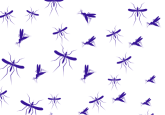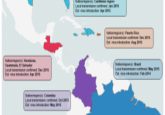Why a major Zika outbreak won’t hit the US

Climate and socioeconomic status play critical roles in the recent Zika explosion, protecting those of us in the United States while spiking risks in Central and South America.

Aedes aegypti
For mosquitoes, recent climate shifts in temperature, precipitation, and humidity have created some pretty cushy conditions throughout the Americas. However, according to a new study in the Journal of Medical Entomology, the rising hysteria over a possible Zika outbreak in the US is profoundly misplaced because such an outbreak depends on specific socioeconomic conditions as well as climate suitability.
According to environmental health scientist Max Moreno-Madriñán and research entomologist Michael Turell, authors of the new study, our lifestyle in the United States largely protects us from local Zika outbreaks. Although tropical temperatures appear to facilitate Zika transmission through Aedes aegyptimosquitoes, preventative factors such as good sanitation, running water, and screened-in housing hold spread of the virus in check.
“If we go back to a standard of living with no electricity, no running water, and having to store barrels of water around your house, we’re going to have outbreaks. But, if we don’t do that—and I don’t see any reason why we should—we’re not going to have an outbreak of yellow fever, dengue, chikungunya, or Zika,” said Turell.
Contrary to other assumptions, Turell and other prominent entomologists maintain that Aedes aegypti mosquitos spread Zika. “There’s a lot of effort being wasted going after other vectors that are not important,” said Turell. Because people get many more Culex bites than Aedes aegypti bites, they mistakenly assumed that Culex must be transmitting Zika. “But, several fairly good studies say that Culex don’t become infected with Zika, even when fed on the same amount of virus that will readily infect Aedes aegypti or Aedes albopictus,” he explained.
According to Turell, once more research begins to target the correct mosquito, the US and other countries should resist the temptation to simply let the virus pass by. International efforts should focus on improving living conditions to combat disease throughout South and Central America, which then will reduce its spread to other nations.
Thankfully, even in nations with spiking local Zika cases, infection rarely causes long-term problems. “We don’t have the diagnostics, we don’t know the real transmission cycle, and we don’t have a good animal model. But, the situation is only dire if you are 22 years old, recently married, and living in Brazil,” said Turell. “If you’re 62 years old of any gender, who cares! Even among women infected when pregnant, only 3% will have a child with microcephaly. The odds are still very much on the side of a normal, healthy child.”
Based on his research, Turell recommends that misleading headlines about impending US Zika outbreaks should be viewed skeptically. “The majority of environmentally suitable areas for Zika spread in the US are relatively socioeconomically advantaged as compared to suitable areas in Latin America,” agreed epidemiologist Jane Messina at the University of Oxford, who was not involved with this study. “This isn’t to say that certain neighborhoods with poorer sanitation might not experience localized spread if the virus [was] introduced.”





